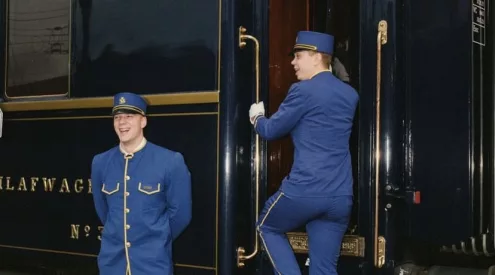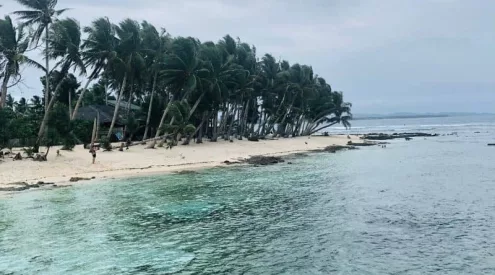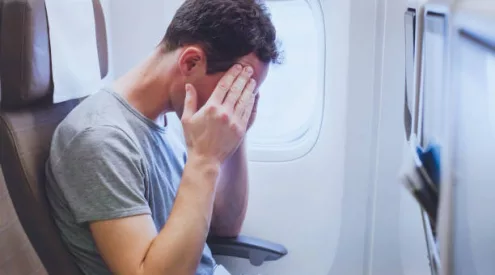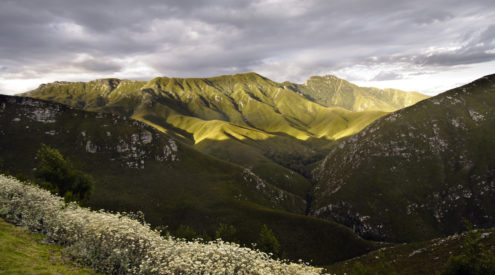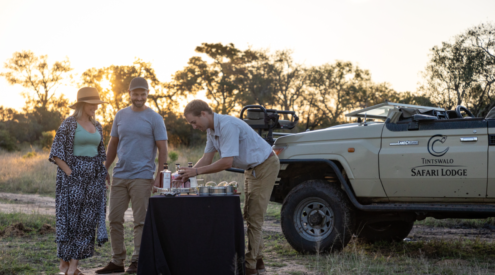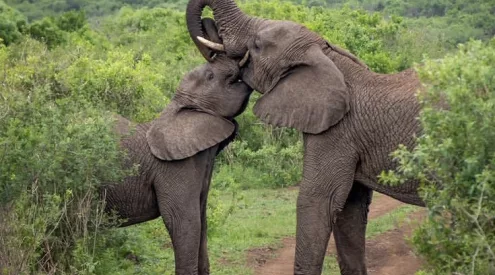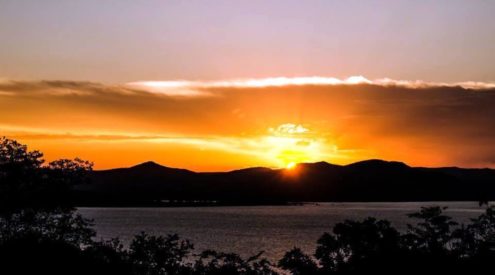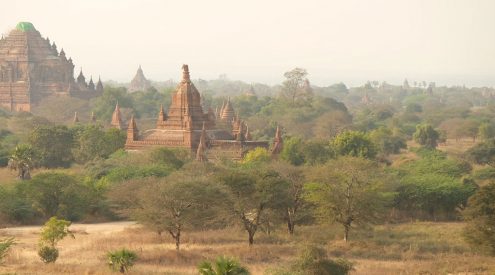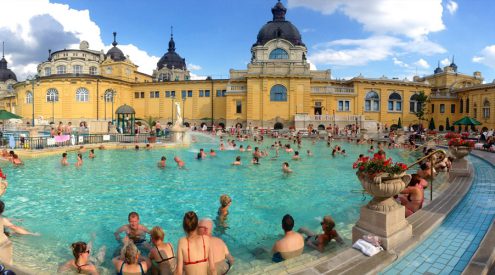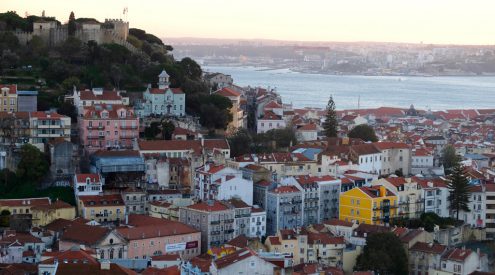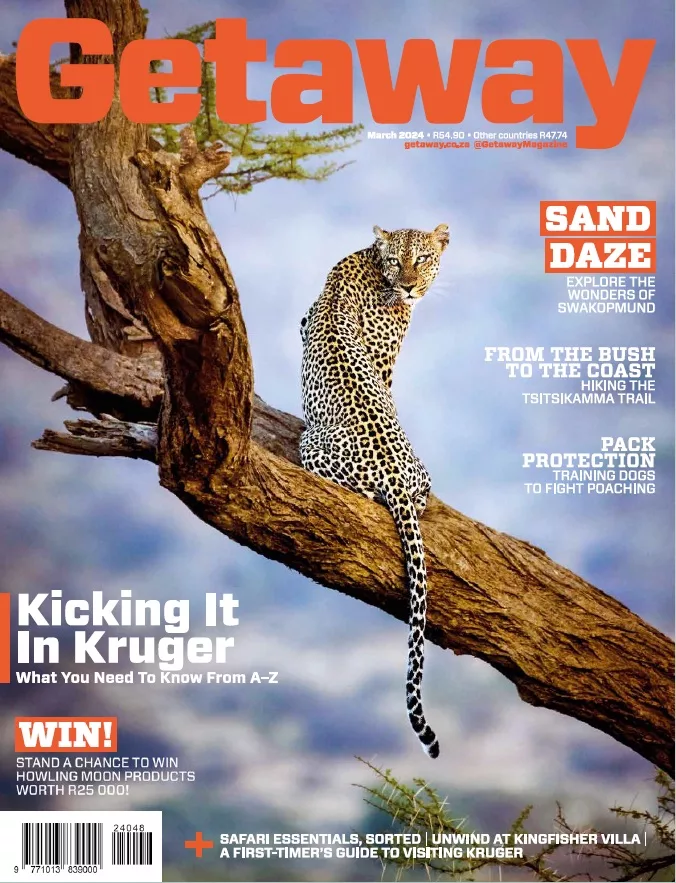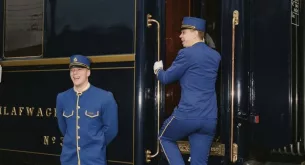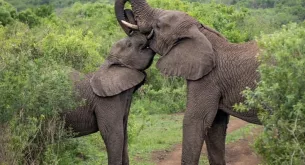The miniature train, royal blue with shiny red trimmings, known fondly as the “˜toy train’, waited patiently on its narrow tracks at Neral Junction. We boarded, and began the slow, winding 800 metre ascent to Matheran, a small town set amidst mountains and forest – its name means “˜jungle topped’.
We gazed out of the window as the train chugged above a dry reddish landscape, where dark green grew in thick clumps. The unspoilt nature was only occasionally interrupted by a scattering of litter which I tried to ignore, as the mountains receded into the distance.
An hour later we reached Matheran, a hill top town with a population of 5000, where motor vehicles and even bicycles are banned; a shady haven to rest the ears and lungs after the chaos of Mumbai. A huge portion of the town’s residents are dogs who sleep the day away, bundles of mongrel pups, sacred cows with calves, goats and bleeting kids, hens hiding chicks under maternal wings, horses, ponies and cats; it is a kind of giant petting zoo. And high up in the trees, are hundreds of mischievous monkeys, picking through the fur behind their babies’ outsized pink ears, bounding through the town, or sauntering into an unguarded home, to steal food which they greedily stuff into their cheeks for later.
That evening, Main Bazaar, the town’s central red dirt road, was alit with fairy lights. Indian tourists wandered past stalls selling plastic toys that spun up into the sky, glasses of rainbow coloured sugary cordial, and the most beautiful handmade leather sandals I had ever seen. It was a carnivalesque scene: people wandered by, wearing luminous rubber necklaces that glowed in the dark; groups of girls strolled arm in arm, enjoying their new found freedom from hooting cars and zipping auto-rickshaws. The road was clean and litter free, thanks to the eco-minded town council, who have imposed a complete ban on plastic bags. “˜This place is pretty much Mumbai’s antithesis”¦’ I wrote in my journal that evening.
The following day, at Main Bazaar, more Indian tourists were arriving; we were yet to see a foreign tourist in Matheran. Large ladies and their husbands were carted in by hand-pulled rickshaws, pulled by young swaggering men. Some arrived on horseback, followed by male and female porters, camouflage suitcases balanced on their heads. A group of ponies ambled along the dusty main road with gas canisters strapped to either side of their bodies and a hungry black cow poked its head into a dustbin that was mounted onto a pole; the bin was only fastened on one side, so it swung back and forth as the cow’s head searched deeper in the bin for breakfast.
After our own breakfast, we took a random route into the village that lay behind our simple guesthouse; it soon seemed like a route that few foreigners take. The villagers stared at us as we wandered slowly past their quaint homes; some retreated shyly inside.
A woman in a bright red sari stood in front of a tall tree, its big, gnarled roots exposed, cutting a bundle of wood into small pieces with a long dirty knife. Behind her, perched higher up, was a tiny sky blue temple, with a square base and a dome in the middle of its flat roof. We peeked through the bars that blocked the temple’s entrance, and saw a shrine of sorts: a poster of a bald man wearing glasses, his one arm raised, palm forward, adorned with marigold garlands and surrounded by small brass containers with lit candle wicks burning in oil, and incense sticks.
The homes on that narrow lane were mostly small, tin constructions – often rusted in parts – but were brightly painted, and had been built carefully, producing a pretty, homely-looking result. Burnt metal drums stood outside, surrounded by metal crockery sets, ready to be washed at the outdoor water pump by housewives on their haunches.
We passed a man painting his wooden rickshaw bright red and orange. He smiled and greeted us as we passed, asked for his picture to be taken, and posed, grinning, proudly holding his paintbrush.
Hay bales were stacked in golden bundles onto the roof of one of the village’s stables. It was the stable where one of the horse riding guides we’d met slept for eight months of the year; he went home to his family in Bangalore during the monsoon.
An old woman lay outside in the shade, on a charpoi: a wooden bed frame strung with criss-crossing pieces of leather or rope. Beyond the tiled entrance pillars to her home – Lakshmi, the Hindu goddess of wealth, was featured on a central tile – were potted plants and a brightly painted fence. The house next door was creamy beige. Artificial marigold garlands hung over the door frame, bordered by brown painted swastikas. The swastika is an ancient Hindu symbol, with multiple positive meanings, including “˜Good Luck’ – also painted, in large brown letters, beside the door.
After several blissfully peaceful days in Matheran, we dismounted after a sunset horse ride, and prepared to leave Matheran for Goa. We had tickets for the Konkan Kanya Express, which departed Mumbai at 11pm, and planned to catch the last train to Mumbai from Neral Junction at 7pm. As Matheran is a vehicle-free town, the taxi stand, from where we would be driven down to Neral Junction, is located three kilometres away from the town’s Main Bazaar. Horses and porters plied the route, but cost money, and were no faster than walking.
We reckoned we had an hour to spare before leaving; enough time for a beer. I fetched two green 660ml bottles of Kingfisher from Santosh’s restaurant-cum-bar, wrapped in brown paper bags, and we drank them on Pramod Lodge’s balcony, looking out onto the dusky plains below.
Beers finished, we strapped our packs on and started walking to the taxi stand. We’d walked a few minutes through the town when I realised I’d left my flip flops in the guest house room. I went back for them, but the room was locked and I could not find any staff to open it for me. I ran to Santosh’s restaurant, and he followed me back to the room, bringing its key. Ten minutes had been wasted when I arrived back at the spot where Iain had been waiting with our bags.
It took five minutes and the start of complete darkness for us to realise what exactly we were walking through: a deserted forest where our horse riding guide assured us he had seen several cobras, one tiger, and a few panthers in his five years in Matheran. We began to make a noise: stomping our feet and raising our voices, hoping to scare off anything that we might bump into en route.
The path forked unexpectedly. I could see the lights of a nearby guesthouse, and ran up to it, ignoring shoulder muscles that groaned: my backpack’s twelve kilograms had begun to weigh me down. “Go straight,” a man on the guest house patio said. “Twenty minutes more.” Twenty minutes more and we might miss our train.
We began to walk fast – as fast as we could – each swinging our water bottles upwards by the handles to land on our moving legs with a loud thump. Predators didn’t like noise, we reasoned, neither did snakes. Nothing was going to come looking for what sounded like a crowd of people. So, a crowd we became: shouting and singing as we tore through the forest in a paranoid frenzy, our torch waving from side to side before us, surveying the bushes.
The path continued, with no sign of light. I thought of the long sweaty hour we had spent in a Mumbai train station, queuing for our tickets to Goa, and of the hefty waiting list that every train for the next few weeks had. Another fork appeared. We argued over a route, chose one, and a few dark metres down, realised that it led to nothing. Cursing, we ran back to the fork, by now soaked with sweat from this never-ending journey, and took the other branch, at the end of which shone the yellow lights of the share taxis to the train station – all empty.
“Neral Junction!” I called to the nearest driver, gasping for breath. We would have to pay for the full vehicle; there was no one to share the taxi with.
“Two hundred and fifty Rupees,” he said solemnly.
“Yes, yes!” I panted, trying to open a door.
“Two hundred fifty,” he repeated, his eyes wide.
“Yes, yes, lets go! Very fast to Neral Junction!”
We reached the first of a series of hairpin bends on the dirt track that wound sharply down toward Neral. Headlights flickering wildly, the vehicle tore round the unbarricaded corner into complete darkness, its horn honking loudly at any oncoming traffic we might meet. And thus, the journey continued, for twenty teeth-clenching minutes (our guidebook estimated forty), until we reached the train station.
There were four minutes until the train to Mumbai departed; it was the last train that would get us there in time. We were at the ticket counter when I realised I would not last the two hour journey without a toilet. I left my bags with Iain and sprinted down the platform, searching for any sign of a toilet. A middle-aged woman noticed my panic, and approached me, miming an enquiry. “Toilet, toilet!” I said, and followed her as she darted across the tracks and pointed to a small concrete building. Two perpendicular walls, each about two metres square, formed a corner in front of a locked door. Whether or not the woman had realised that the door – presumably to a toilet – was locked or not, I did not know, or care. I was concealed behind the concrete, which, I imagined, was a better place than the toilet itself, sure to be vile. When the woman reappeared, poking her head round the concrete corner, neither of us flinched.
I dashed back across the tracks, and onto the train with Iain. We slumped onto a hard seat in one of the third class carriages, and noticed the fine layer of Matheran’s pink dust that coated our bodies; our shoes took on a dusky hue. Streaks of dark red had formed where dust met sweat on our legs. Adrenalin still surged through my blood, but my body had begun to give way to complete exhaustion – and relief. We would soon be on an overnight train to the coast.
Read the rest of Mumbai’s hill station escape at OldWorldWandering.com, travel stories from an overland journey from Shanghai to Cape Town.

